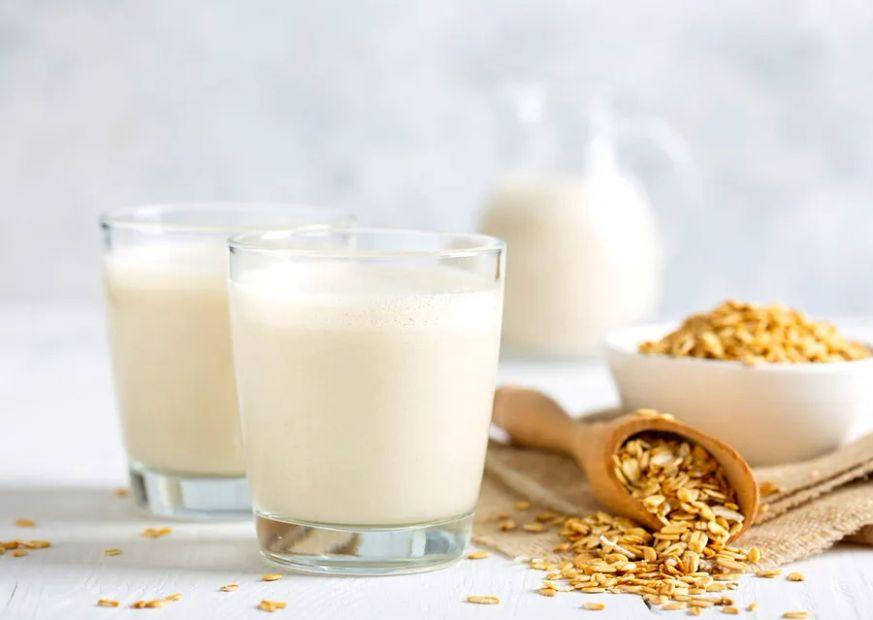What Is Oat Milk? Here's What You Should Know

For vegans and those avoiding dairy, the market offers a wide range of milk alternatives. After the rise of soy and almond milk, options made from cashews, pecans, hemp seeds, and pea protein followed. Oat milk has recently emerged as a popular, eco-friendly, and nutrient-rich choice. Even traditional cow's milk drinkers are loving its creamy texture. Keep reading to discover everything about this plant-based drink and its health perks.
What Exactly Is Oat Milk?
Oat milk likely originated in Sweden, with the innovative company Oatly leading the charge. It's made by soaking oats in water, blending them, and straining the mixture. Most of the oats' nutrients stay in the liquid, and the result is a creamy texture. Plain oat milk has a subtle oat flavor that remains after preparation.
How Is Oat Milk Produced?
Commercial oat milk is produced by blending oats with water, then milling the mixture to a smooth consistency. Enzymes are used to break down the starches, and the bran solids are filtered out to leave a liquid base. Flavorings and other ingredients are added before the milk is heat-treated for longer shelf life and packaged. You can also make oat milk at home using a cheesecloth or nut milk bag for straining.
To enhance the fat content and texture of commercial oat milk, oils like sunflower or canola are added. Sometimes, sugar or flavorings are included as well. The milk is also enriched with vitamins and nutrients to improve its overall nutritional value.
Is Oat Milk Nutritious?
Oat milk is an excellent choice for people with gluten intolerance or allergies to soy or tree nuts. Just check the label to ensure it's not processed alongside these allergens. It’s lower in calories than both soy and cow’s milk, offers a higher fiber content, and surprisingly provides more calcium than cow’s milk.
Here's a comparison of their nutritional profiles:
- One cup of oat milk contains about 80 calories, 11 grams of carbohydrates, 3 grams of fat, 1 gram of fiber, 4 grams of sugar, and 2 grams of protein. By drinking a cup, you get 20 percent of your recommended daily value of vitamin D, 20 percent of vitamin D, 25 percent of vitamin A, 35 percent of calcium, 25 percent for riboflavin, and 100 percent of vitamin B12.
- One cup of whole cow's milk contains 150 calories, 12 grams of carbohydrates, 8 grams of fat, 11 grams of sugar, 8 grams of protein, and no fiber. One cup contains 30 percent of your recommended calcium intake and 25 percent of your recommended dose of vitamin D.
- One cup of soy milk contains 110 calories, 9 grams of carbohydrates, 4.5 grams of fat, 2 grams of fiber, 6 grams of sugar, and 8 grams of protein. Its nutritional highlights include 30 percent of the recommended values for calcium; 30 percent for riboflavin; 15 percent each for vitamin D, vitamin A, and phosphorous; and 120 percent for vitamin B12.
How Can You Use Oat Milk?
Oat milk’s creamy texture makes it a great addition to smoothies and coffee drinks. It even froths up beautifully in beverages like lattes. For the best results in coffee, try options like Oatly Barista Edition, which include an acidity regulator to help prevent separation in your drink.
You can substitute unsweetened, unflavored oat milk for cow’s milk in various recipes. Like cow’s milk, oat milk has a naturally sweet flavor. Use it in dishes like quiche, mashed potatoes, muffins, pancakes, and creamy sauces. It’s also perfect for recipes that already call for plant-based milks like soy or almond, such as this Chocolate Pudding recipe.
What’s the Best Oat Milk to Buy?
Oat milk is now available from many brands, both on store shelves and in the refrigerated section. You’ll find different flavors, such as chocolate, vanilla, and blueberry, or richer, creamier versions that are ideal for coffee. Some popular brands include Silk, Oatly, Califia Farms, Elmhurst, Pacific Foods, and Quaker.
To get the most out of oat milk, choose a variety that doesn't include carrageenan, a thickener linked to digestive problems and inflammation, or any artificial additives like colors and flavors. Also, opt for an unsweetened, unflavored version to avoid unnecessary sugar.

We’re highlighting the biggest trends in home cooking, based on insights from our passionate cooking community. After analyzing data from 1.2 billion annual visits to Dinogo.com and 2.5 billion page views, we took a deeper dive, surveying home cooks about their favorite ingredients, tools, and recipes. Oat milk is just one of the many topics sparking interest. Check out our full "State of Home Cooking" special report.
Evaluation :
5/5



